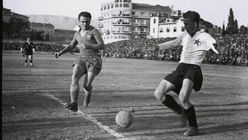












Football's Finest
A database of the greatest teams and the most fascinating stories in the sports history.



Hadjuk Split 1945-1955
The Resistance

During World War II, Yugoslavia was invaded, occupied and subsequently carved-up by the Axis powers. The city of Split, home of Hadjuk Split, was annexed into Italy. The club were offered to play in the Italian first division under the name AC Spalato, however they refused due to their opposition to the assimilation, instead ceasing to compete entirely as an act of defiance. When Split returned to Croatia, the clubs attitude remained the same because they were upset that the Croatian authorities had sold the city out when they partitioned them to Italy. When the Allies invaded Italy and took over the Mediterranean, the Adriatic Islands became a haven for the resistance, and Hadjuk Split was reborn on the island of Vis.
They began playing as the official football team of the Yugoslav resistance, competing against Allied service football teams from Italy and famously playing the British army in Bari, before beating them 1-0 in a rematch in the liberated Split a few years later. In 1945, the club embarked on a tour through Egypt, Palestine, Lebanon, Syria and Malta. They played over 90 games, winning 74 of them. At the same time, Allied aircraft dropped fliers all over Europe encouraging other clubs to follow Hadjuk’s example. Charles de Gaulle crowned Hadjuk the honorary team of Free France. Josip Tito, the first President of Yugloslavia, was impressed by their unique Dalmatian spirit and became a fan of the team. He invited Hadjuk to move to Belgrade and become the official Yugoslav People’s Army team, but they declined to continue playing in Split. Their reputation as Tito’s favorite resulted in Hadjuk becoming one of the few clubs not be disbanded by the Communist government after the war.
The period that followed was to become the clubs first golden era. They continued to play in the Yugoslav championship, winning it in 1946. The following year, they visited Australia, becoming the first club to play on every continent. Split took out the 1950 Yugoslav championship without a single loss. The clubs official fan organisation, Torcida, was founded that year. Named after passionate Brazilian fans, it was the first organised supporters group in Europe. Torcida weren’t well liked by the communist authorities as they were viewed as a hostile organisation. Their founder Vjenceslav Zuvela was thrown in jail and Hadjuks captain was expelled from the communist party. They went on tour in South America at the invitation of Juan Perron in 1952-53, but this cost them the championship that year, losing to Red Star by a two point margin.
The communist party continued to sanction the club when Beara and Vukas arrived late to national team training and received a month long ban from football. They again lost the championship as a result, this time to Dinamo. Club legend Frane Matosic stormed a meeting at the Yugoslav FA demanding an explanation. But in April 1955, Hadjuk smashed Dinamo 6-0, the biggest win in the derby between Croatia’s two biggest clubs. They also won the championship that year. However, the Yugoslav FA refused to let them participate in the inaugural European Cup, making them play in the less glamorous Mitropa Cup instead. Throughout the early 1950’s, Hadjuk possessed it’s most iconic generation of players, winning three Yugoslav championships. Frane Matosic was among these, scoring 729 goals in 739 games - a club record which will never be beaten. His teammates included club icons such as Bozo Broketa, Ljubomir Kokeza and Slavko Lustica, players who have gone down in the annals of this proud club.
Achievements: Banate of Croatia First League – Champions x 1
Socialist Republic of Croatia First League – Champions x2
Yugoslav First League – Champions x3
Star player: Vladimir Beara, DoB 26 August 1928, Zelovo, Yugoslavia, nickname: The Ballet Dancer with the Hands of Steel
Thought to be one of the greatest goalkeepers of his era, Beara was born to a Serbian family in modern day Croatia. He mainly kept goal for Hadjuk Split and made 308 appearances for them. He helped them win the Yugoslav title in 1950, 1952 and 1955. He then moved to Red Star where he collected four more Yugoslav titles and a couple of Yugoslav Cups. Notably, he was Red Star’s goalkeeper against Manchester United in their last game before the Munich Air Disaster. He received the ultimate compliment from legendary keeper Lev Yashin in 1963, who stated that it was Beara, and not him, who was the greatest goalkeeper of all time. He was an athletic and confident goalkeeper, with a brave attitude who excelled in coming off his line. He was nicknamed “The Ballet Dancer with the Hands of Steel” due to his elegant style, and “Big Vlad” following a showstopping performance against England. Beara won a silver medal at the 1952 Olympics, where he saved a Ferenc Puskas penalty. He represented the Yugoslavian nation at 3 World Cups. He went on to coach various clubs in Germany, Austria, Holland and Yugoslavia, as well as Cameroons national team. He died in 2014 after several strokes.

GK- Vladimir BEARA
DF- Ivan RADOVKINOVIC 2 DF- Bozo BROKETA DF-Miroslav BRKLJAKA
MF- Slavko LUSTIKA 6 MF- Ervin KATNIC 5 MF- Ljubomir KOKEZA 7
FW- Bernard VUKAS FW- Bosko SENKAR FW- Frane MATOSIC 10 FW- Josko VIDOSEVIC
SUBS:
Lenko GRCIC, Ante MLADINIC 15, Kresimir ARAPOVIC, Ante VULIC, Nikola RADOVIC, Ante ZANETIC, Sulejman REBAC
Manager: Ljubo BENCIC
Home Ground: Kod Stare Plinare













